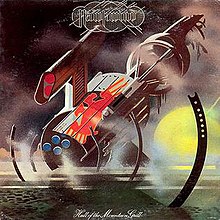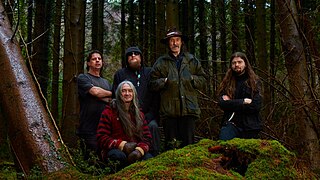
Hawkwind are an English rock band known as one of the earliest space rock groups. Since their formation in November 1969, Hawkwind have gone through many incarnations and have incorporated many different styles into their music, including hard rock, progressive rock and psychedelic rock. They are also regarded as an influential proto-punk band. Their lyrics favour urban and science fiction themes.

Space Ritual is a 1973 live double album recorded in 1972 by UK rock band Hawkwind. It is their fourth album since their debut, Hawkwind, in 1970. It reached number 9 in the UK Albums Chart and briefly dented the Billboard Hot 200, peaking at number 179.

"Urban Guerrilla" is a 1973 song by the UK rock group Hawkwind. It was originally released as a single in the UK on 27 July 1973 with "Brainbox Pollution" as the B side, reaching #39 on the UK singles chart before being withdrawn after 3 weeks. It is also on the remastered version of Doremi Fasol Latido.

Nicholas Robert Turner was an English musician, best known as a member of space rock pioneers Hawkwind. Turner played saxophone and flute, as well as being a vocalist and composer. While with Hawkwind, Turner was known for his experimental free jazz stylisations and outrageous stage presence, often donning full makeup and Ancient Egypt-inspired costumes.
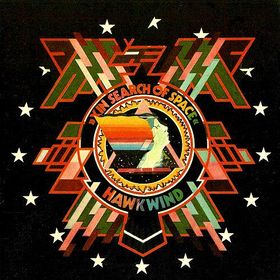
In Search of Space is the second studio album from Hawkwind, released in 1971. It reached No. 18 on the UK Albums Chart.

Warrior on the Edge of Time is the fifth studio album by the English rock band Hawkwind. Many of the lyrics are by Michael Moorcock, and the album is loosely based on the concept of Moorcock's novel The Eternal Champion. It was the band's highest-charting studio album on the UK Albums Chart, where it peaked at number 13, and was their third and last album to make the U.S. Billboard chart, where it peaked at number 150. Reviews have been mixed, with Melody Maker panning the album and particularly criticizing the vocal work while the All Music Guide has praised the album for features such as the songwriting. This would also be the last album to feature the band's bassist Ian "Lemmy" Kilmister, who was fired from the band one day before the album's release.

Quark, Strangeness and Charm is the seventh studio album by the English space rock group Hawkwind, released in 1977. It spent six weeks on the UK albums chart peaking at number 30.

Doremi Fasol Latido is a 1972 album by English space rock band Hawkwind. Recorded at Rockfield Studios and released on United Artists Records, it was their third album since their debut, Hawkwind, in 1970. It reached No. 14 on the UK album charts.

BBC Radio One Live in Concert is a 1991 live album of a 1972 concert by Hawkwind.
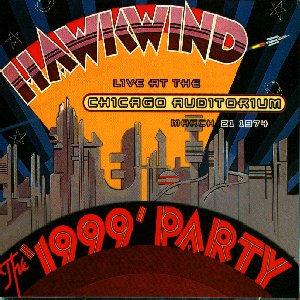
The '1999' Party is a live album by Hawkwind recorded at the Chicago Auditorium Theatre on 21 March 1974 released retrospectively in November 1997 by EMI. It was issued for the first time as part of EMI's re-releasing re-mastered versions of the Hawkwind back catalogue. A further budget single disk derived from this set titled Hawkwind Live 74 was issued in April 2006.

Roadhawks is a 1976 compilation album by Hawkwind covering the years 1970-1975, and it peaked at #45 on the UK album charts. It is the first compilation release from the group, marking the end of the group's tenure with United Artists Records. The music was compiled and mixed by the group's Dave Brock.

Masters of the Universe is a 1977 compilation album by Hawkwind covering the years 1971 to 1974 while the group were contracted to United Artists Records. It is the group's second compilation album, after the previous year's Roadhawks, and was compiled and released without the band's input or approval.

Bring Me the Head of Yuri Gagarin is a live album by English rock group Hawkwind released in 1985 consisting of a performance at the Empire Pool, Wembley on 27 May 1973. This is a poor sound quality audience recording licensed by Nik Turner. The recording has been released numerous times under different names, with different covers and bundled into box sets.
The discography of the British space rock group Hawkwind spans from their formation in 1969 through to the present day, with consistent output of live and studio albums, EPs and singles. The group have used aliases to release some albums in an attempt to either redefine themselves, as with the 1978 album 25 Years On released under the name Hawklords, or simply to distinguish the piece of work from their usual output, as with White Zone released under the name Psychedelic Warriors.
Alan Davey is an English musician, best known as the former bassist with the rock band Hawkwind. He is the original bass player in Gunslinger which started in 1979 and is still the bass player and vocalist for Gunslinger. He was writing a new album for 2018 release on Cleopatra Records, as well as two solo albums for 2018 and 2019 release, and is also writing music for movies and TV shows. He has also played and recorded with Meads of Asphodel, Dumpy's Rusty Nuts, Spirits Burning, Bedouin (1998–2003). He formed with the newly re-imagined Hawklords in 2008 with Nik Turner until 2012 and since then formed The Psychedelic Warlords in 2013 until 2015.

"Silver Machine" is a 1972 song by the UK rock group Hawkwind. It was originally released as a single on 9 June 1972, reaching number three on the UK singles chart. The single was re-issued in 1976, again in 1978 reaching number 34 on the UK singles charts, and once again in 1983 reaching number 67 on the UK singles charts. The original mix has been re-released on the remasters version of In Search of Space.
Simon King is an English drummer most noted for his work with Hawkwind. He was described in 1985 by British rock magazine Sounds as the 'definitive rock drummer.'
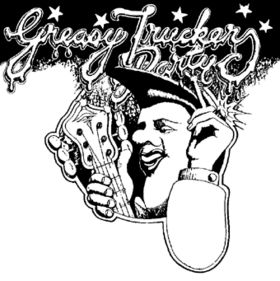
Greasy Truckers Party is a 1972 live album by various artists recorded at a February 1972 Greasy Truckers concert at the Roundhouse in London. The concert featured three bands, Man, Brinsley Schwarz, and Hawkwind, and musician Magic Michael. Originally a double vinyl album, in a limited edition of 20,000 and sold at just £1.50, it rapidly sold out, and became a collector's item.
In the world of British underground rock, the Greasy Truckers Party ... ... looms about as large as the Monterey International Pop Festival does in American rock lore; it wasn't the biggest gig ever played by the bands involved, but for reasons of exposure, and resulting word-of-mouth, and the excerpted live album that followed, it came to define what they were capable of.
Del Dettmar is best known as synthesizer and keyboard player with the English space rock band Hawkwind from 1971 to 1974.
